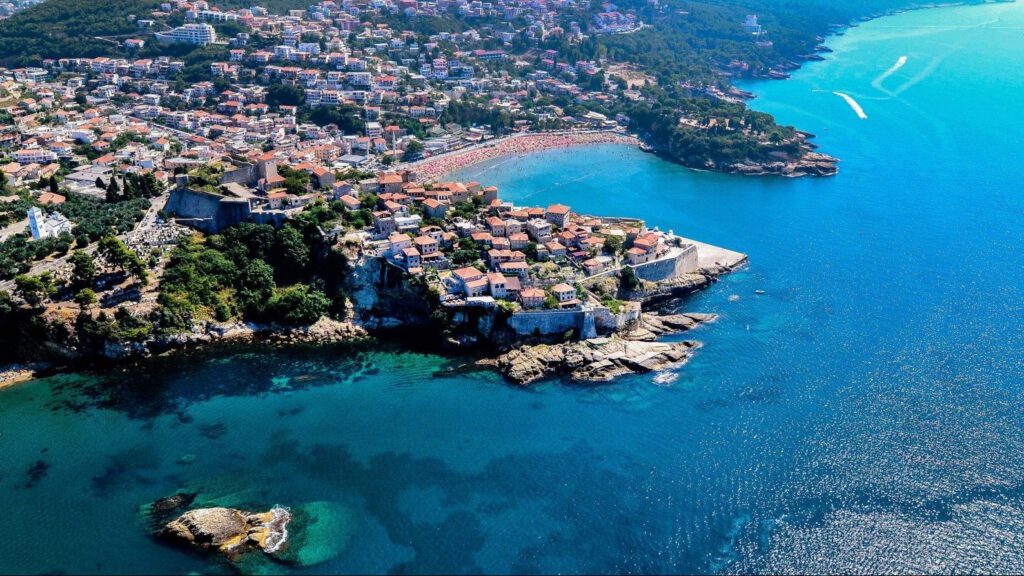Has Montenegro truly defeated COVID-19?
*This blog is published as part of the regional blogging initiative “Tales from the Region” on the experience of western Balkan countries with the COVID-19 Pandemic, published between 24 June 2020 and 6 July 2020. The initiative is coordinated by Res Publica (North Macedonia), in partnership with the Institute for Democracy and Mediation (Albania), Analiziraj.ba (BiH), KIM Radio (Kosovo), Sbunker (Kosovo) the civic initiative „Ne Davimo Beograd“ (Serbia) and PCNEN (Montenegro).
Author: Ksenija Milovic
On June 2nd, Montenegro declared the end of the epidemic. Coming out of the first wave, the country’s balance was the following: 324 infected and 9 deceased. Now Montenegro is facing economic challenges and there is great uncertainty regarding the tourist season. Initial estimates clearly show that revenues from tourism will be reduced by 70 per cent!
According to relevant experts, a country with a small population, such as Montenegro, and a low population density, has a predisposition to successfully bring the epidemic under control.
At the same time of officially confirming the outbreak, the population was bombarded by the media with a tally of casualties, misfortunes and adverse events, as well as daily updated casualty numbers from other European countries (Italy, Spain, Great Britain). This led to a feeling of general trepidation, people wondering when the numbers of the infected and the deceased will rise sharply, i.e. when Montenegro will experience that ominous peak on the chart that shows the progress of the pandemic.
The press conferences of the National Coordination Body for Infectious Diseases (NCT) informed on a daily basis on the numbers of infected and deceased, as well as the possibilities of creating so-called clusters or hotbeds of the outbreak. Such situations, unfortunately, go hand-in-hand with fear and panic, instead of reason and conscience, thus various fabrications were disseminated throughout Montenegro, telling stories of hundreds of infected people and predictions of an “Italian scenario”.
Citizens cannot shake the feeling that we went from one extreme to another overnight – from draconian measures, bleak forecasts and uncertainties, to complete easing of the measures and the Government’s calls for vacationing in Montenegro.
The COVID-19 pandemic has proven to the world that the virus knows no boundaries. The atmosphere in Montenegro at the end of 2019 in no way indicated what kind of life we can expect in the coming months. In December, the Law on Religious Freedom was passed in Parliament, once again causing Montenegrin society to be divided. The public’s attention was entirely focused on the outcomes of that law, so all other topics were put on the back burner. Enormous borrowings, in support of the long-unstable economy, investments in national companies that are proven to have negative outcomes in their operations, and even the COVID-19 pandemic were not caught by the public’s radar.
Last in Europe to get the first case of infection
With its regular announcements, the Institute for Public Health of Montenegro informed the public on the progression of the pandemic worldwide, as well as the risks for our country. Due to a combination of circumstances, Montenegro was the last country in Europe to record the first case of infection. The National Coordination Body for Infectious Diseases has adopted the first set of measures to prevent the spread of the epidemic. They came into force on March 16, with a planned duration of at least 15 days, and included: closing down educational institutions, ban on all public gatherings in Montenegro, ban on visits to hospitals and prisons and banned the entry of all cruisers and yachts. On March 17, the first two cases of infection were registered in Montenegro. The reactions of the population were greatly influenced by panic, which resulted in overcrowded supermarkets and people stocking up on groceries enough to last them as much as four months. Soon there was a shortage of protective equipment (gloves, masks) and multi-purpose disinfectants. Unfortunately, the high demand for disinfectants has led to the owners of certain pharmacies to double their prices. According to the Minister of Economy, such a move does not constitute a violation of the law but is unethical.
Although preventive measures were adopted relatively on time, the Government of Montenegro and the National Coordination Body for Infectious Diseases initially did not inform the public about capacities of health facilities, stocks of disposable materials, protective equipment, number of tests and respirators. This has created a leeway for additional mistrust and insecurity in the capacity of the Montenegrin health system by a number of citizens. Apart from that, mistrust and insecurity were additionally fueled by corruption scandals that shook Montenegro in the previous year and proved to have damaged the state budget by several million. Independent media in Montenegro featured appeals from health workers claiming that they do not have protective equipment available (an example is the chief of the internal medicine department of the hospital in Ulcinj).
Citizens of Montenegro who stayed abroad, on their return, were placed in facilities designated for quarantine (14 days in facilities repurposed for quarantine during the pandemic and 14 days at home). In the first days, when the self-isolation regime was still not clearly established, there was evidence of individual violations of the imposed measures. Then, a list with personal data of all those to whom these measures were imposed appeared on the official website of the Government of Montenegro. The reactions of the public were divided in this case as well, while certain organizations sent requests to assess the constitutionality of this move.
With the introduction of curfews, bans and restrictions on movement, the number of persons who violated measures and regulations was rising daily. Fines were among the highest in the region (800 to 2 000 euros), and citizens who have committed a violation were detained for several hours in the premises of security centres, where it was not possible to maintain the recommended physical distance. Citizens’ resentment and mistrust were gaining momentum, with claims that not everyone is equal before the law.
With the increase in the number of registered cases, the measures were further tightened. Catering facilities, shopping malls, craft shops were closed… Despite previous statements by line ministries that there would be no consequences for the economy, many households went into poverty by closing jobs and discontinuing payments. The government’s aid packages for small and medium-sized enterprises have managed to help employees in some way, however, workers and companies that are in the domain of the so-called “grey economy” have found themselves in a difficult position. Namely, such employees are not recognized in the system, although their activity in some way brings “live” capital into the Montenegrin economic system, yet in another way, it is harmful in the long run.
Although a third envisaged aid package has been announced, it has not been delivered yet. The government is trying to shift the public’s focus to clashes with the opposition (in Budva, the electoral will of the citizens was altered. Since 2016, the DPS and the coalition have been the opposition in that city. with plots and unpleasant scenes happening in front of the Municipality building, on a daily basis.
Small country, big challenges for the healthcare system
As the educational institutions were among the first to be closed, distance learning was organized on March 23 under the auspices of the Ministry of Education, and in cooperation with televisions broadcasting on a national frequency. The presented content closely followed the curriculum, but we must wait until next year to know for sure how successfully the students have mastered their subjects. One of the better things that happened is precisely the greater representation of educational content on television. There are indications that in the future one part of (additional) classes will be conducted in this way.

During the pandemic, all medical interventions for non-life-threatening patients were suspended. Cancer patients were able to continue with the necessary therapies they receive within health facilities, but the rest were left to wait and endure the agony. Given that Montenegro is among the countries with a smaller population (625,266 inhabitants and the population density is 45.27/km2), it seems that it is not too much of a challenge in the future to establish a health system that will withstand all emergencies and conduct its regular activities at the same time.
It should be borne in mind that all the measures and decisions imposed are in fact political, and were made in consultation with relevant experts. Also, in Montenegro, as well as in several other countries in the region, it is an election year, so certain moves of the current government were interpreted as an election campaign. That is, the ruling party has already entered the election campaign through media representation, aid distribution and the work of the National Coordination Body for Infectious Diseases. The ruling coalition has set August 30th as the date for the elections (as a reminder, the previous parliamentary elections were on October 16th, 2016).
According to public opinion polls, the citizens of Montenegro showed the most trust in the National Coordination Body for Infectious Diseases. Members of the NCT are also members of the Presidency and Main Board of the Democratic Party of Socialists, so it can be unmistakably concluded that the ruling party is counting on a successful exit from the epidemic as fuel for victory in the next elections (despite divisions in Montenegrin society based on identity issues and the unpromising economic situation).
According to the information of the Government of Montenegro, the last infected patient recovered on May 24, when the restrictive measures were largely revoked or loosened. As there were no new reported cases, the end of the epidemic was declared on June 2.
The number of tests performed is around 12 000, but the public was deprived of information about what kind of tests were used and how much the so-called “fast” or orientation tests were represented. The country came out of the first wave of the pandemic with the following balance: 324 infected and 9 deceased.
As early as June 14, a new imported case of infection appeared. It was a BiH national. As Montenegro opened its borders to neighbouring countries except for Serbia, tensions in society intensified. That is, the public was burdened with statements given in a disconcerting tone, between the two ministers of health (of Serbia and of Montenegro), but also from other high-ranking officials. After June 14, the number of confirmed cases is increasing every day, and members of the Government and the NCT declared that the initial cause is the church processions (which have been held in Montenegro for over half a year, in response to the Law on Freedom of Religion) and the Partizan-Crvena Zvezda soccer derby.
Economic aftermath and lessons learnt from the pandemic
Montenegro is now facing economic challenges and there is great uncertainty regarding the tourist season. Last year, 1.35 billion euros were invested in the ten largest tourism projects, all with the goal of exceeding last year’s number of tourists (2.6 million). Initial estimates clearly show that tourism revenues will be reduced by 70 per cent.
The sudden opening of borders and the race against the clock for our country to be declared a “corona free” destination clearly show that all efforts are being made to save the tourist season. Although the Institute of Public Health is still testing and the number of confirmed cases is showing an evident increase as compared to the first period of the fight against COVID-19, the population is behaving quite nonchalantly, where the authorities call for personal responsibility. That is, the virus never disappeared, it is merely currently passive and waiting for the most suitable way to create a new hotbed. It is in the nature of the virus to spread, and we humans are ideal targets (we socialize, move and travel). The negative events of the sharp rise in the numbers of infected people in the region served as a warning to Montenegrin authorities that preventive measures should be different. In the end, China, which has shown the greatest levels of preparedness in the fight against the pandemic is still performing triage, tests and is sending all persons entering the country to mandatory fifteen-day quarantine.
During the epidemic, the number of victims of domestic violence was proven to grow. The NGO “Sigurna zenska kuca” (Safe House for Women) appealed for additional accommodation for its recipients of care because their available capacities had been exceeded in the first weeks of the epidemic.
Great victories are achieved by teamwork. That includes fighting a pandemic. Responsible government, media that do not manipulate with sensationalist headlines, doctors who are immune to corruption are the basis for trust among citizens. Specifically, in Montenegro, it was painlessly proven that the health system does not have adequate working conditions, help was arriving even in the advanced days of the epidemic. In the run-up to the new budget rebalance in Montenegro, citizens hope that relevant experts will be consulted to a higher extent on matters related to the economy. The question at hand is when will Montenegro take a course of stable economic policy and build an economy that will not rely mostly on tourism, but on agriculture, small and medium businesses.
Leading up to the parliamentary elections, tensions in society are growing. The public’s attention is diverted from large budget borrowings, and the focus is shifted to everlasting identity issues in Montenegro. Pre-election slogans contain praises for the authorities for their victory over COVID-19, and long-standing problems are slowly re-emerging. According to experts, the real consequences of the economic crisis in Montenegro will be felt in the fall. According to the estimates of political analysts and oppositional MPs, after the parliamentary elections, the citizens of Montenegro are in for pay cuts and an economic crisis the likes of which is unprecedented.
Citizens, brought to the brink of poverty, poisoned by national, religious and identity divisions, are increasingly being pushed into conflict. Therefore, with the victory over the epidemic, we hope that reason and the will to live a decent life will finally prevail in Montenegro. That is, we hope that during all this time we have not only learned how to wash our hands properly.
The epidemic has shown that a high degree of personal responsibility and conscience can be the best weapon in crisis situations, but also that the state and the entire system are as strong as their weakest links. Single parents, parents of children with special needs, people with chronic health problems, socially vulnerable categories, i.e., individuals whose life otherwise, due to various circumstances, most resembles quarantine, carried the greatest burden during the epidemic.
The pandemic did the unthinkable, the world came to a stop for a moment and we were given the opportunity to re-examine our actions as individuals and as a society. It is a shame to have an epidemic of this magnitude in the 21st century, but perhaps this will remind us that science, solidarity, interpersonal (state, regional) cooperation and good intentions must always be the trend.
About the author: Ksenija Milovic is a molecular biologist and a member of the main board of the opposition political party in Montenegro – Demos. She is a member of the presidency of the Women’s Forum and a member of a political network in Montenegro. Committed to achieving all the social issues that can contribute to becoming a society of equal opportunities for all.


